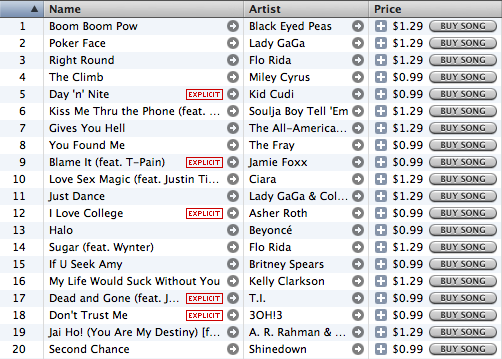Tuesday marks the end of Apple's one-price-fits-all model at the iTunes Store, where songs will now fall into one of three pricing tiers, with many of the most popular tracks commanding a 30% increase from 99 cents to $1.29.
Many songs will remain priced at 99 cents while some older and less popular tracks are expected to fall to 69 cents. But as of Tuesday morning, those cheaper songs were few and far between. Instead, Apple appears to have made price increases its first priority.
As of press time, 6 of the top 10 and 29 of the top 100 songs on the digital download service saw their price increase 30 cents to a $1.29. Many of those same songs remain at 99 cents over at the Cupertino-based company's largest digital rival, the Amazon MP3 Store, where none of the top 10 singles and only 10 of the top 100 songs are priced above 99 cents.
Apple has long placed the blame for this week's hikes on the record labels, who are struggling to adjust to the digital marketplace for their content now controlled by iTunes, which last year became the world's largest retailer of music.
The iTunes operator said back in January that this week's changes would correlated directly with new prices commanded by record labels, who otherwise would not have been willing to make their music catalogs available on the service in unprotected iTunes Plus format.
"[B]ased on what the music labels charge Apple, songs on iTunes will be available at one of three price points -- 69 cents, 99 cents and $1.29 -- with many more songs priced at 69 cents than $1.29," said Apple chief executive Steve Jobs.
While iTunes has rejuvenated interest in music and drawn in buyers that may have joined the masses of pirates on peer-to-peer file sharing networks, it's fragmented sales for labels at the same time. The lone sore spot has been a loss of high-margin album sales with consumers instead taking advantage of iTunes' a-la-carte format to cherry pick their favorite tracks without forking over the full $10+ that the service -- and traditional brick-and-mortar music stores -- charge for an artist's complete work.
As such, the labels are now scrambling to find ways to cash in on their most popular offerings. One approach has been a concept called iTunes Pass. Similar to an iTunes Season Pass for TV shows, the digital offering combines upcoming album releases with exclusive singles, videos, and other media that will be made available to subscribes over the period of several weeks or months for a premium price.

The top 20 songs and their prices on Apple's iTunes Store as of April 7th.
In February, Warner's Reprise Records kicked-off the program with an $18.99 iTunes Pass that coincided with the release of Depeche Mode's new album Sounds of the Universe. According to the Wall Street Journal, this week will see the second installment of an iTunes Pass -- a $17 subscription from Sony Corp.'s Epic Records for the pop band the Fray.
"It's one more thing that helps offset the negative," said Apple iTunes chief Eddy Cue, who sees iTunes Pass as a means for record labels to keep their album releases relevant for longer periods of time. "[Once a traditional album] gets out the door, you can't update it, you can't refresh it, you can't do anything to it."


